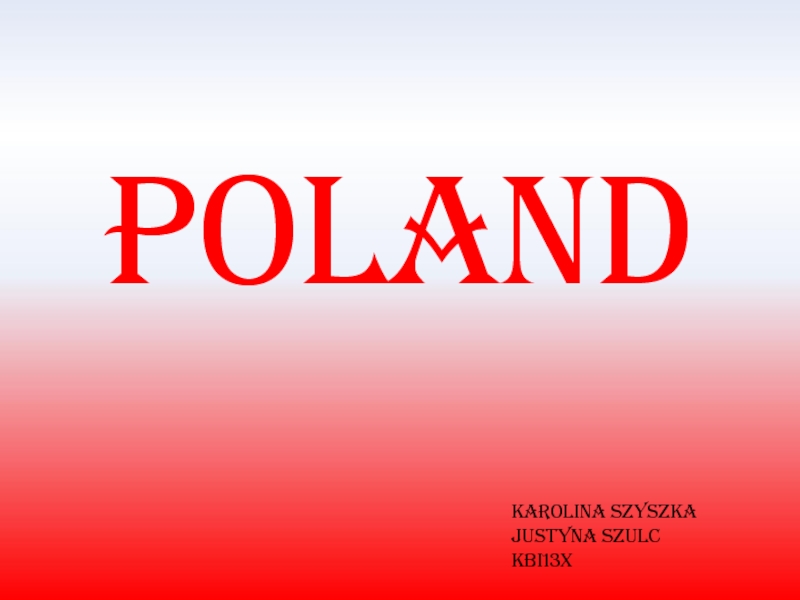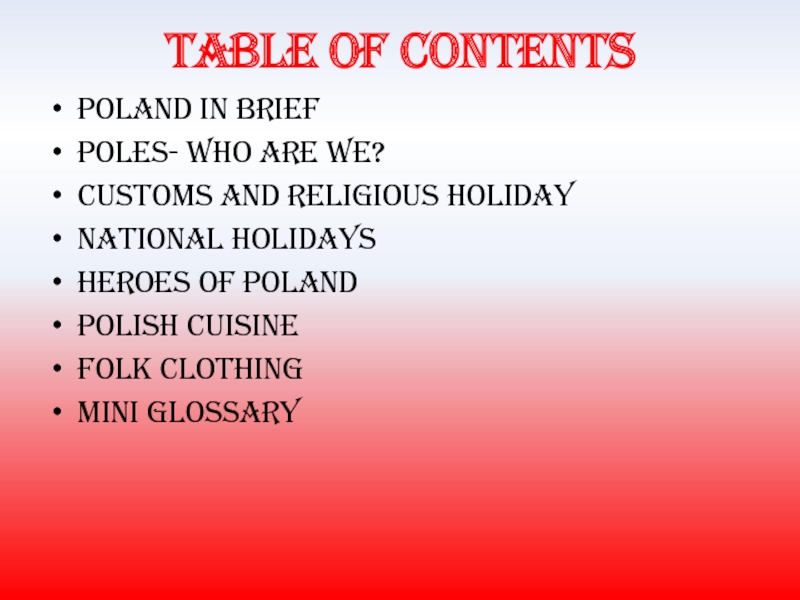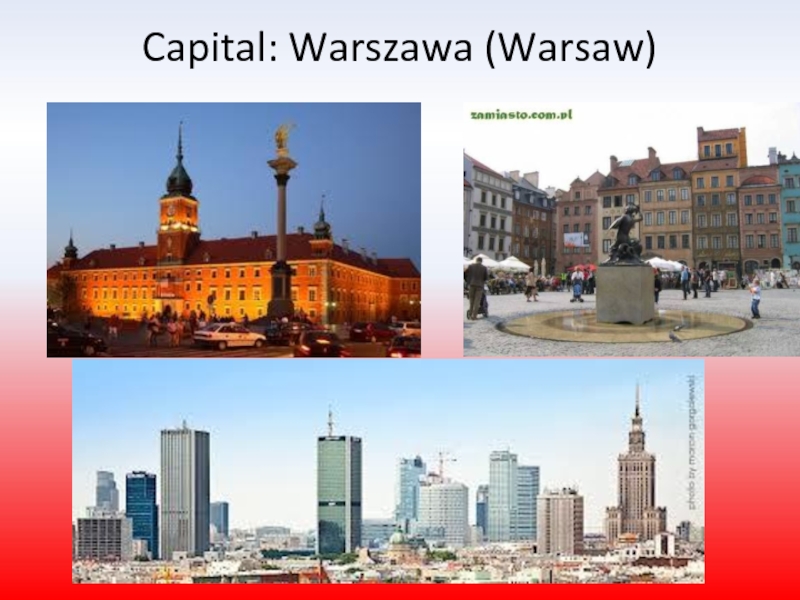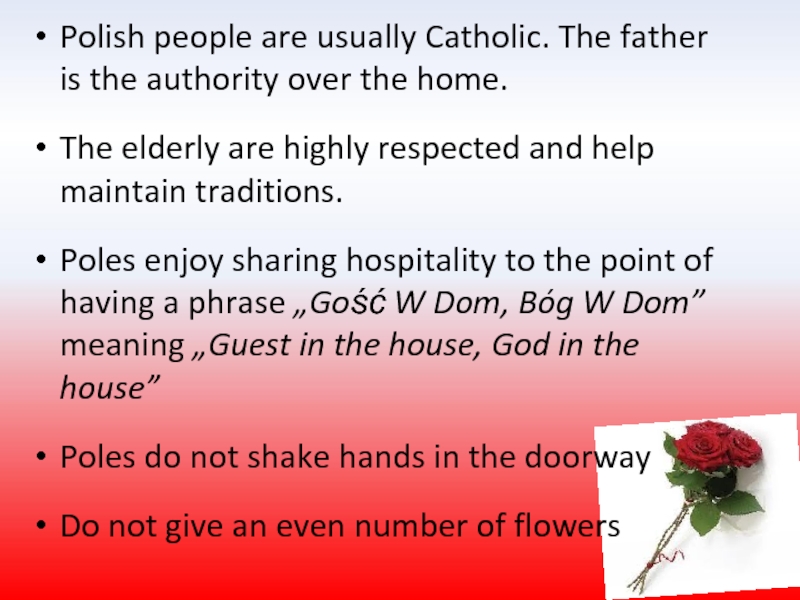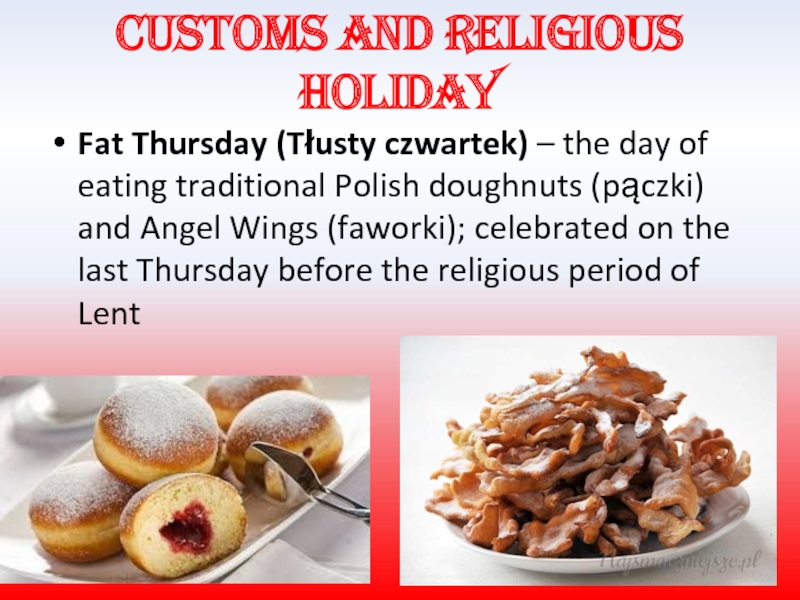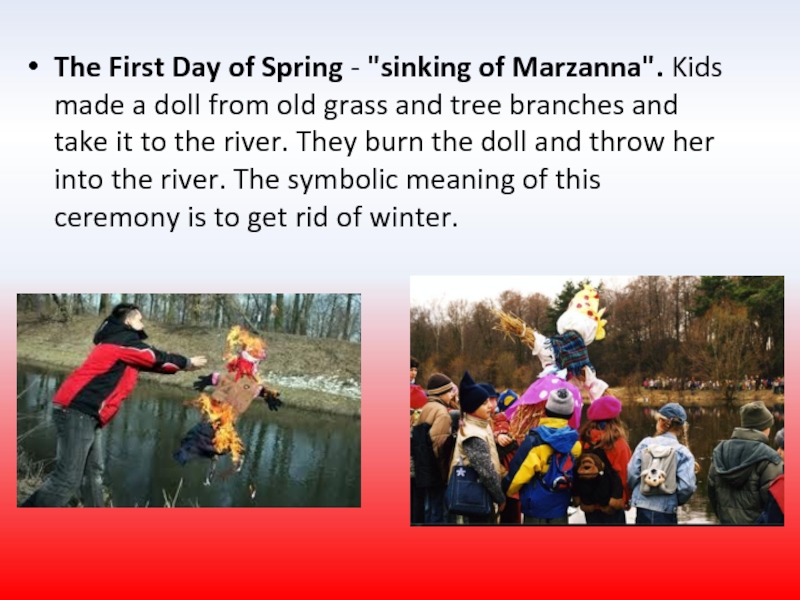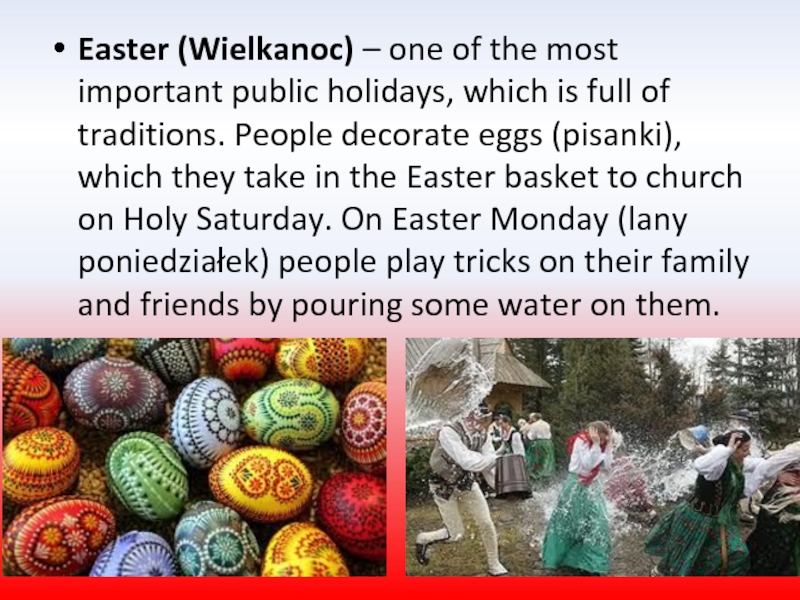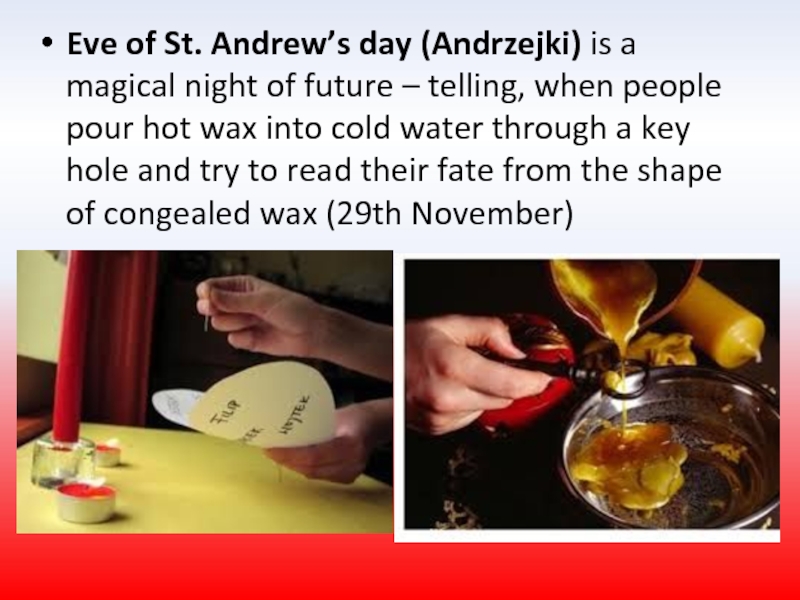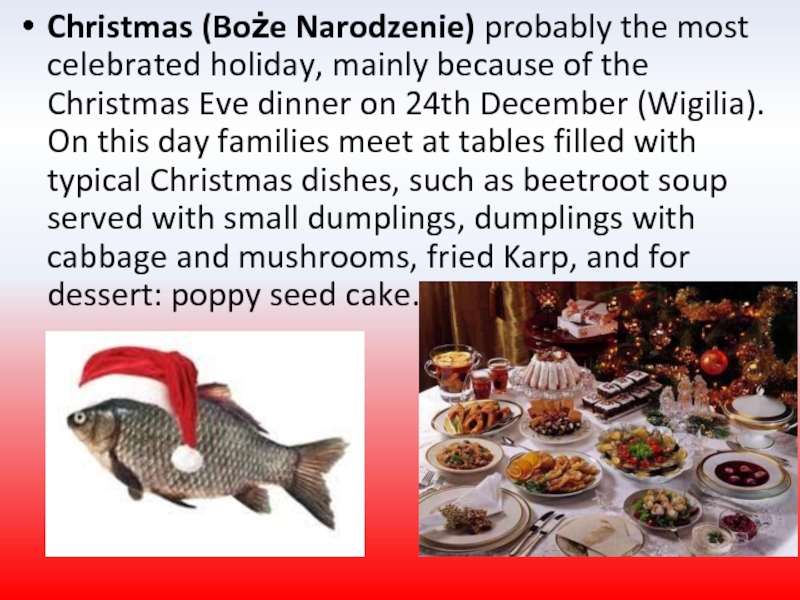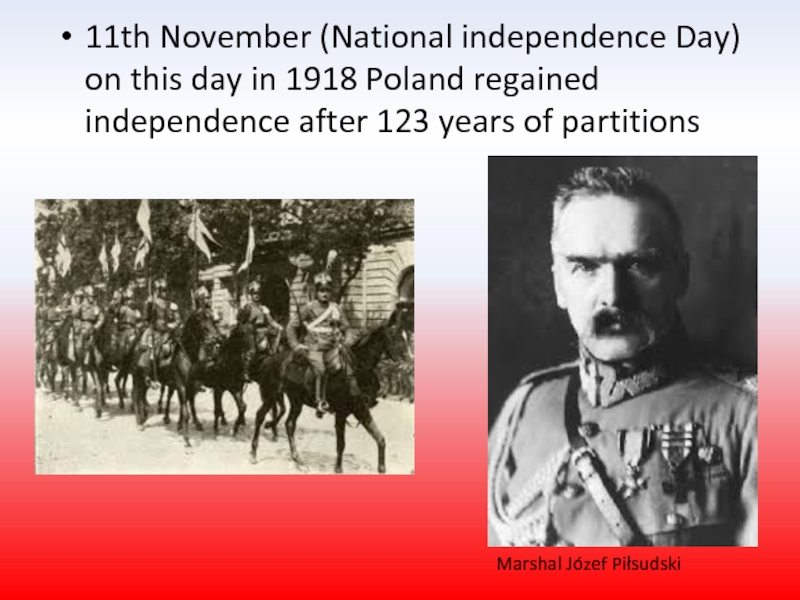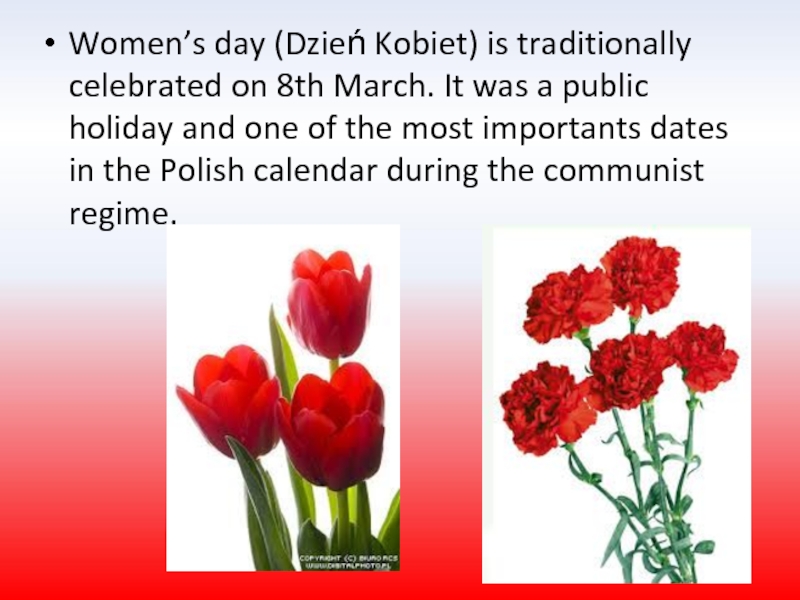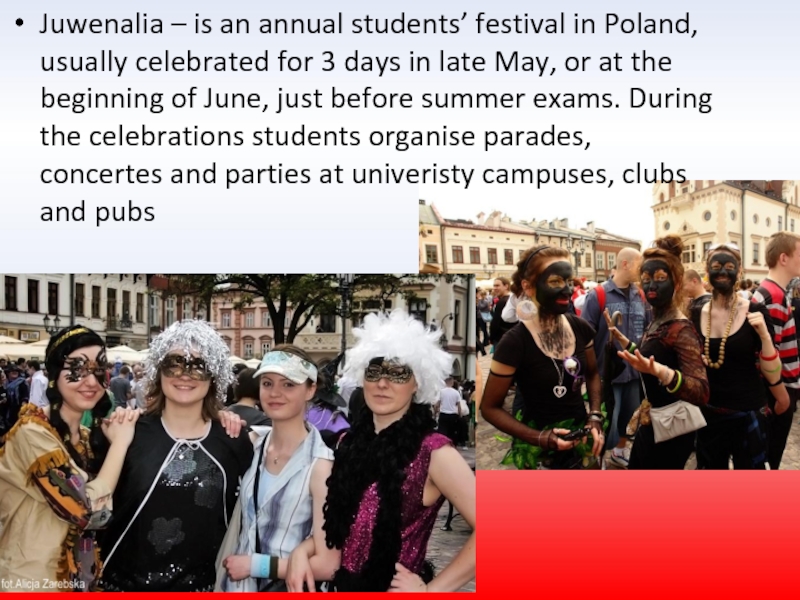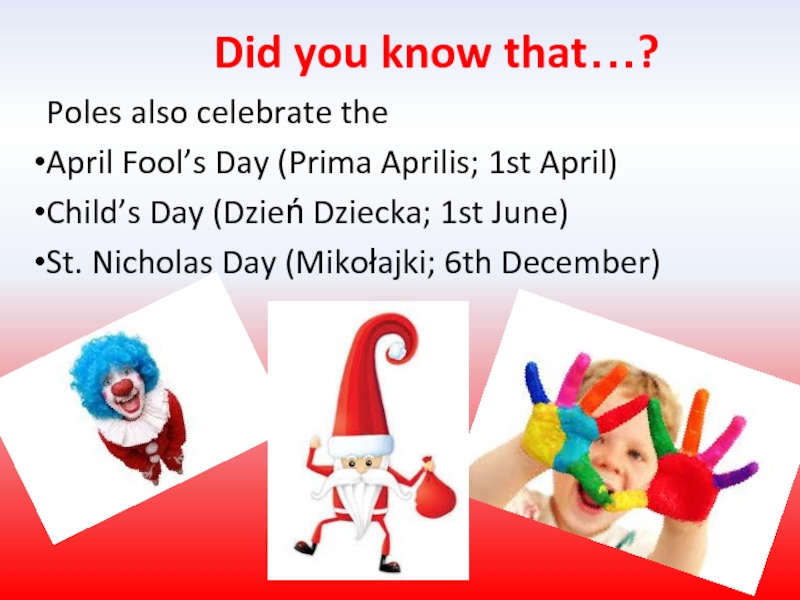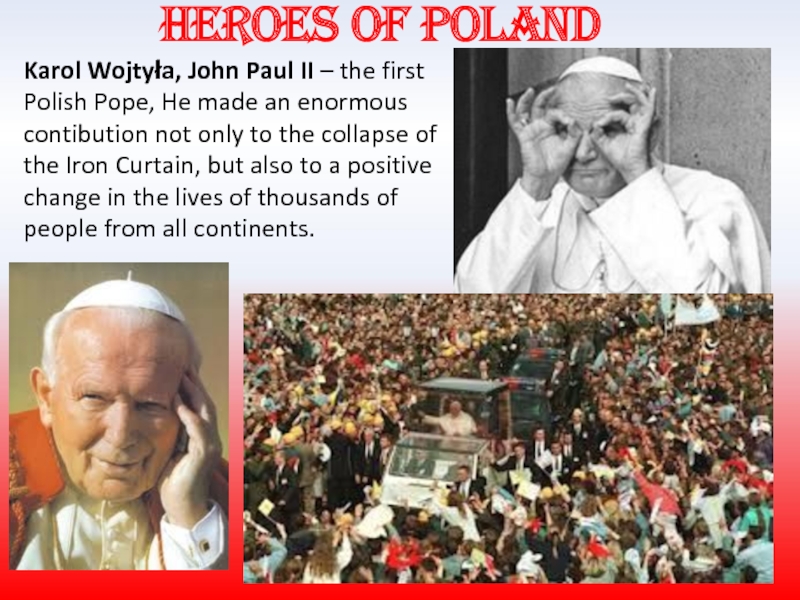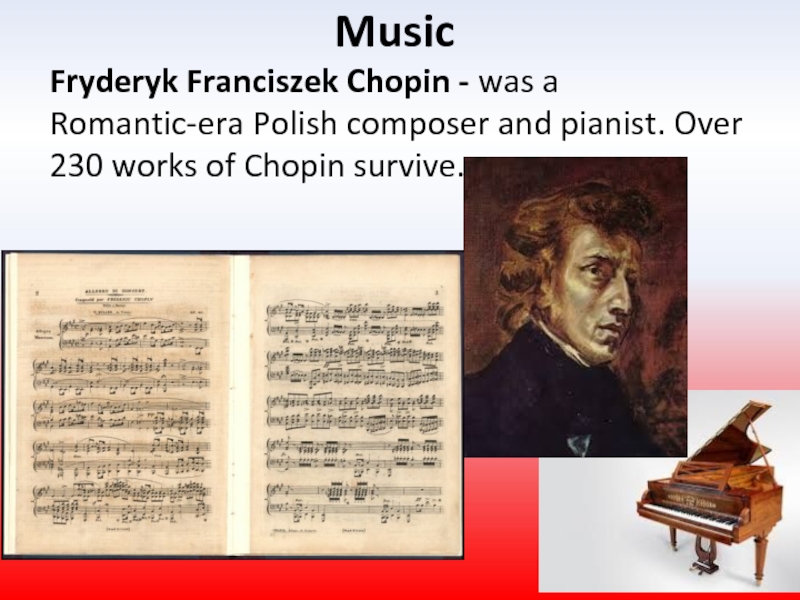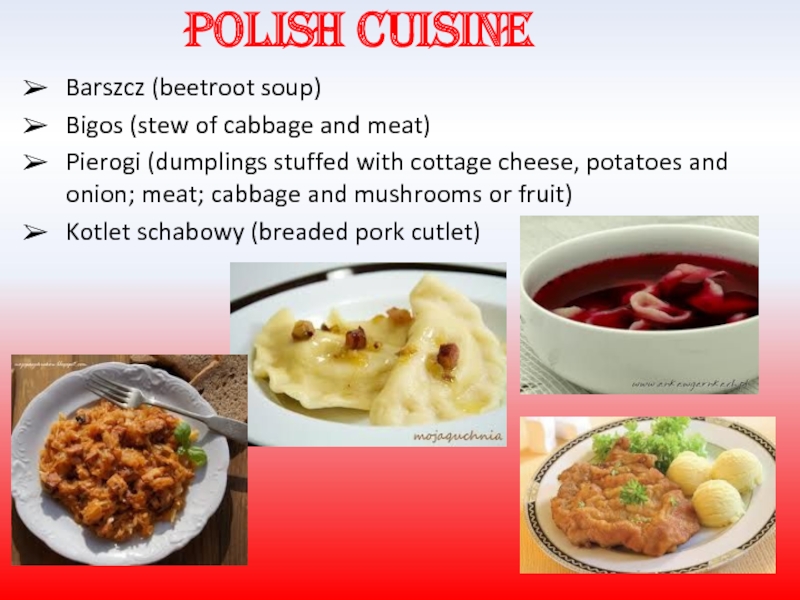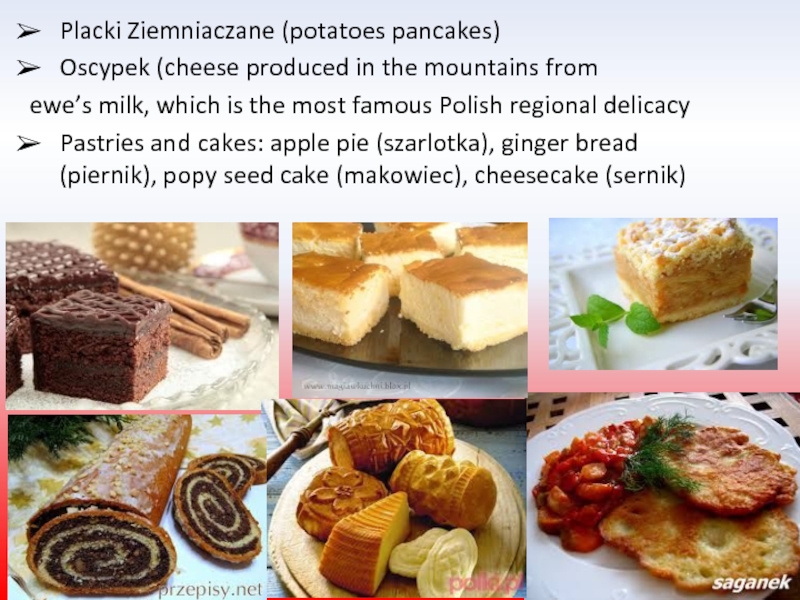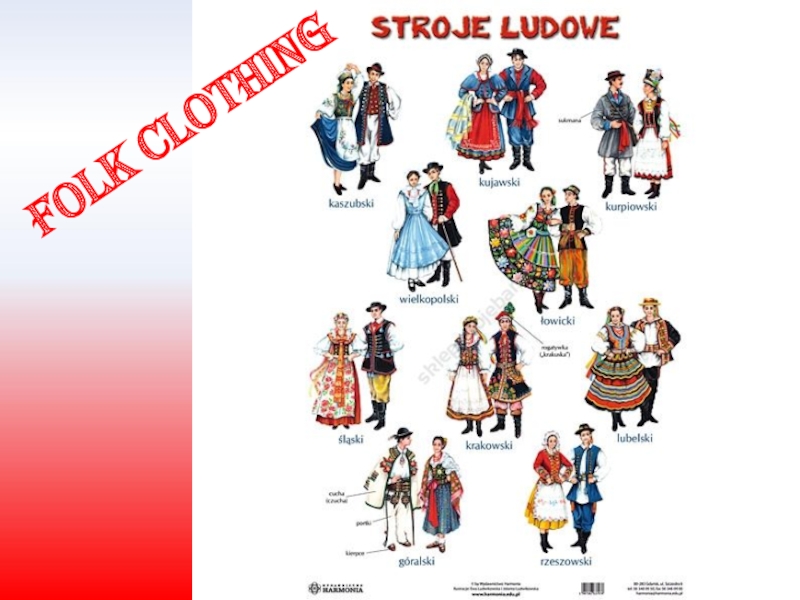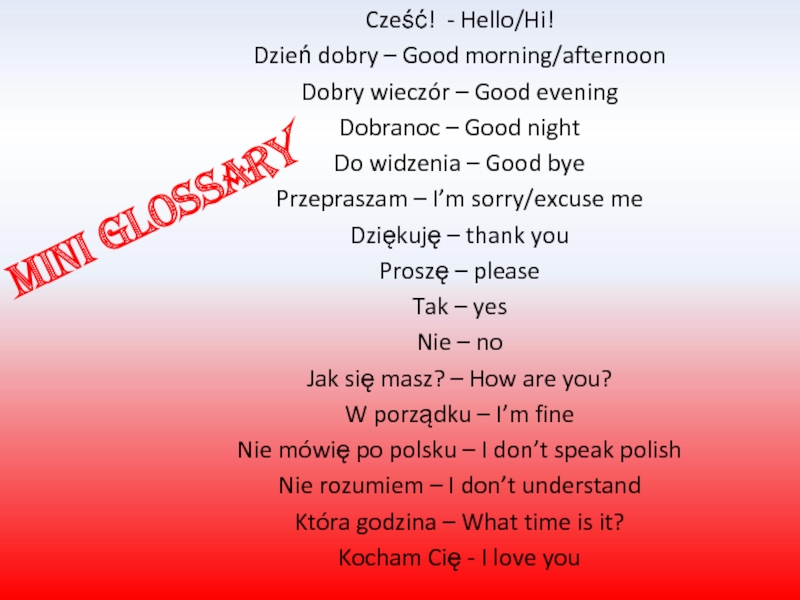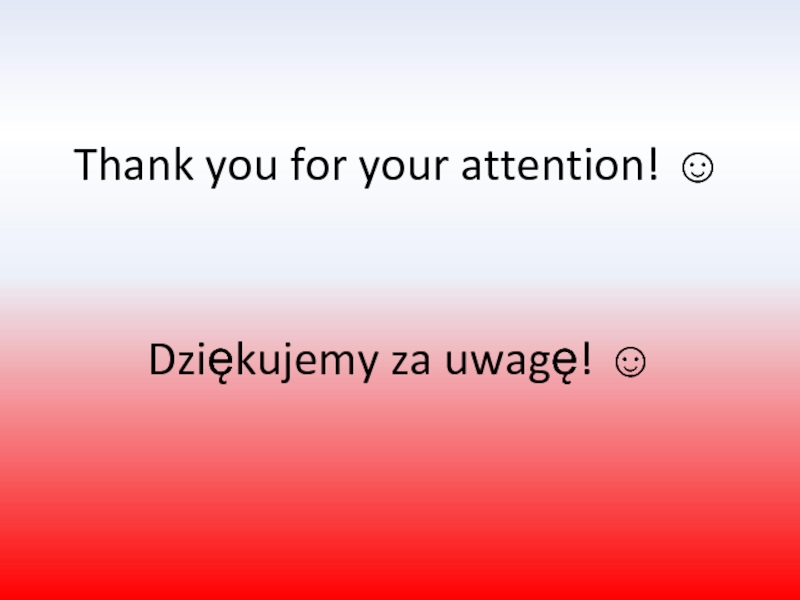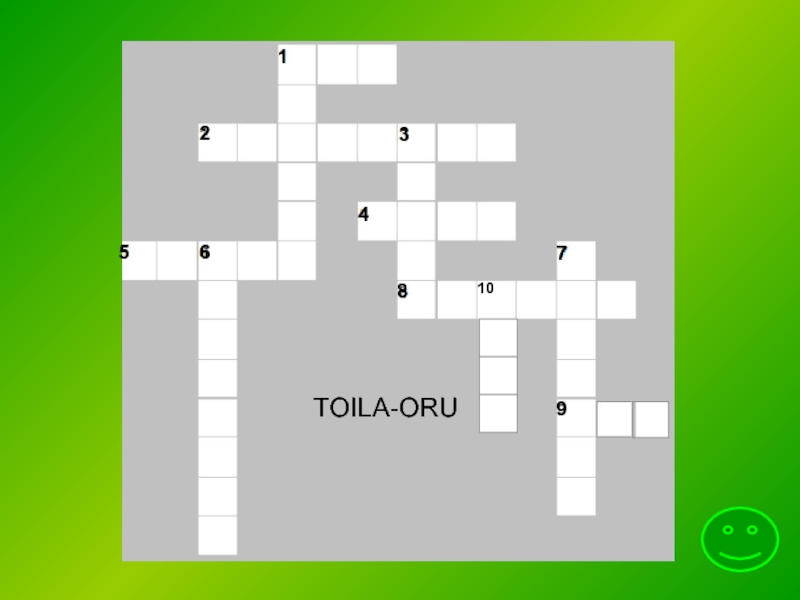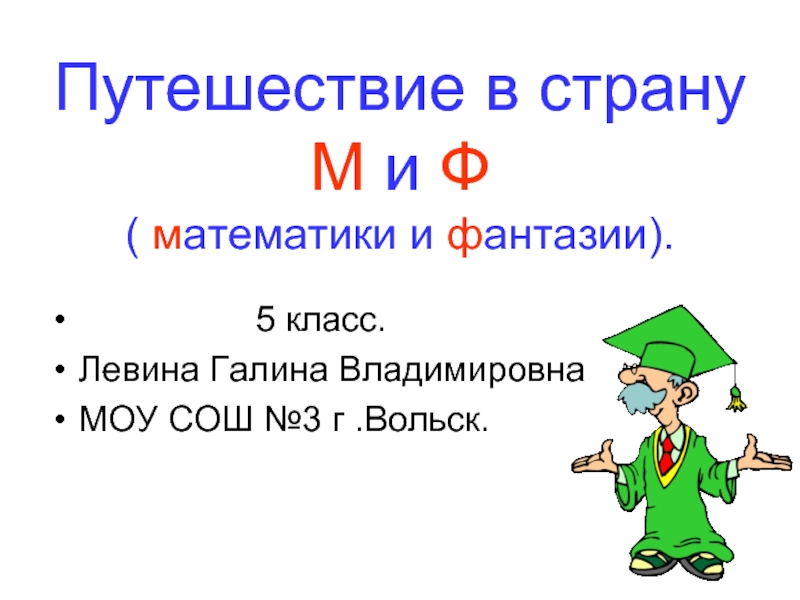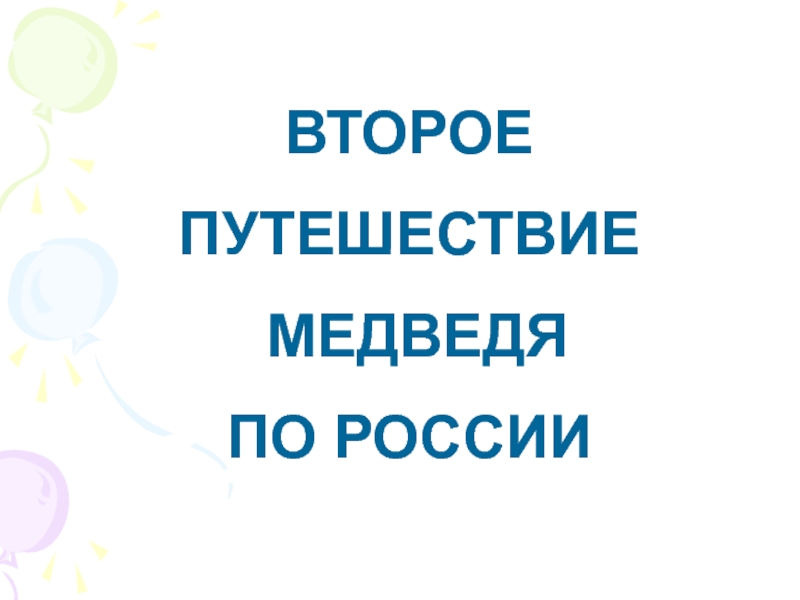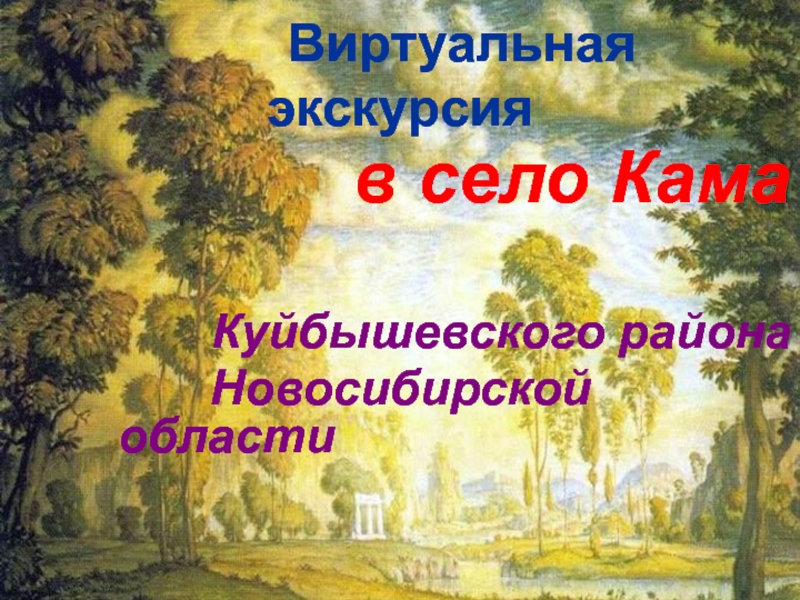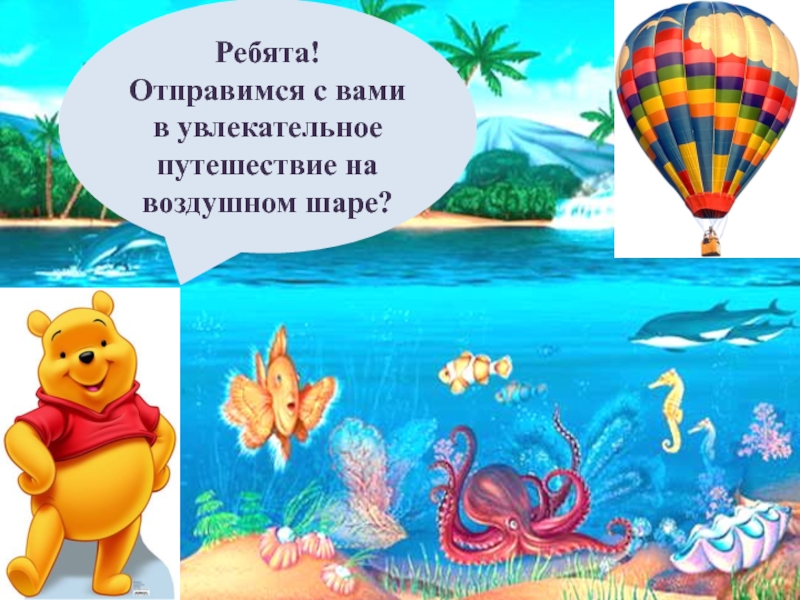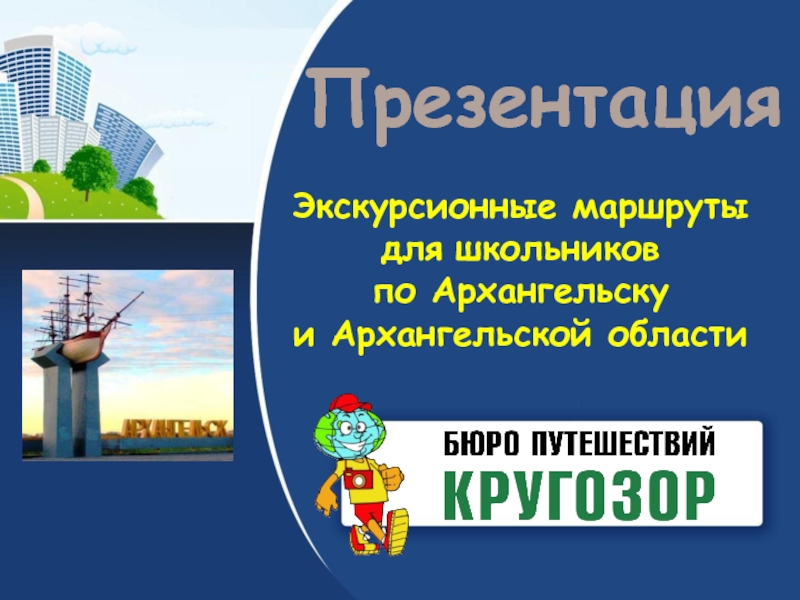- Главная
- Разное
- Дизайн
- Бизнес и предпринимательство
- Аналитика
- Образование
- Развлечения
- Красота и здоровье
- Финансы
- Государство
- Путешествия
- Спорт
- Недвижимость
- Армия
- Графика
- Культурология
- Еда и кулинария
- Лингвистика
- Английский язык
- Астрономия
- Алгебра
- Биология
- География
- Детские презентации
- Информатика
- История
- Литература
- Маркетинг
- Математика
- Медицина
- Менеджмент
- Музыка
- МХК
- Немецкий язык
- ОБЖ
- Обществознание
- Окружающий мир
- Педагогика
- Русский язык
- Технология
- Физика
- Философия
- Химия
- Шаблоны, картинки для презентаций
- Экология
- Экономика
- Юриспруденция
Poland презентация
Содержание
- 1. Poland
- 2. Table of contents Poland in brief Poles-
- 3. Poland in brief Flag: two horizontal
- 4. Official language: Polish Currency: złoty, PLN (1€=4zł)
- 5. Capital: Warszawa (Warsaw)
- 6. Area: 312,685 sq km (9th largest
- 7. Poles- who are we? Polish people touch
- 8. Polish people are usually Catholic. The father
- 9. Customs and religious holiday Fat Thursday (Tłusty
- 10. The First Day of Spring -
- 11. Easter (Wielkanoc) – one of the most
- 12. Eve of St. Andrew’s day (Andrzejki) is
- 13. Christmas (Boże Narodzenie) probably the most celebrated
- 14. There are many rituals connected with this
- 15. National holidays 3rd May (Constitution Day) on
- 16. 11th November (National independence Day) on this
- 17. Women’s day (Dzień Kobiet) is traditionally celebrated
- 18. Juwenalia – is an annual students’ festival
- 19. Did you know that…? Poles also celebrate
- 20. Heroes of Poland Karol Wojtyła, John Paul
- 21. Music Fryderyk Franciszek Chopin - was a
- 22. Science Nicolaus Copernicus (Mikołaj Kopernik) – astronomer
- 23. Maria Skłodowska-Curie – was a physicist-chemist famous
- 24. Polish Sportspeople Justyna Kowalczyk Robert Kubica Adam Małysz Kamil Stoch
- 25. Polish cuisine Barszcz (beetroot soup) Bigos (stew
- 26. Placki Ziemniaczane (potatoes pancakes) Oscypek (cheese produced
- 27. Folk clothing
- 28. Mini Glossary Cześć! - Hello/Hi! Dzień dobry
- 29. feel invited! ☺ http://www.youtube.com/watch?v=xhlz7u8NXds
- 30. Dziękujemy za uwagę! ☺ Thank you for your attention! ☺
Слайд 2Table of contents
Poland in brief
Poles- who are we?
Customs and religious holiday
National
holidays
Heroes of Poland
Polish cuisine
Folk clothing
Mini Glossary
Heroes of Poland
Polish cuisine
Folk clothing
Mini Glossary
Слайд 3Poland in brief
Flag: two horizontal stripes of
equal width the upper
one
white and the lower one red
Emblem: white eagle with
a golden crown on the red shield
white and the lower one red
Emblem: white eagle with
a golden crown on the red shield
Слайд 4Official language: Polish
Currency: złoty, PLN (1€=4zł)
Government: Parliamentary Republic
Economy: free market economy
since 1990
Major cities: Warszawa, Wrocław, Kraków, Łódź, Poznań, Gdańsk, Rzeszów
Location: Central Europe
Major cities: Warszawa, Wrocław, Kraków, Łódź, Poznań, Gdańsk, Rzeszów
Location: Central Europe
Слайд 6Area: 312,685 sq km
(9th largest country in Europe)
Population: 38,5 mln
, out of
which: 95% are Poles; among
national minorities are: Germans, Bielarusians and Ukrainians;
Religion: 90% Roman Catholic Church
Time zone: GMT+ 1hour
which: 95% are Poles; among
national minorities are: Germans, Bielarusians and Ukrainians;
Religion: 90% Roman Catholic Church
Time zone: GMT+ 1hour
Слайд 7Poles- who are we?
Polish people touch frequently by shaking hands
Kissing both
cheeks or kissing the hand is common
Politeness requires an attention to status. The act of holding a door open for a woman or someone of higher status is high important
Punctuality is important to Poles
Politeness requires an attention to status. The act of holding a door open for a woman or someone of higher status is high important
Punctuality is important to Poles
Слайд 8Polish people are usually Catholic. The father is the authority over
the home.
The elderly are highly respected and help maintain traditions.
Poles enjoy sharing hospitality to the point of having a phrase „Gość W Dom, Bóg W Dom” meaning „Guest in the house, God in the house”
Poles do not shake hands in the doorway
Do not give an even number of flowers
The elderly are highly respected and help maintain traditions.
Poles enjoy sharing hospitality to the point of having a phrase „Gość W Dom, Bóg W Dom” meaning „Guest in the house, God in the house”
Poles do not shake hands in the doorway
Do not give an even number of flowers
Слайд 9Customs and religious holiday
Fat Thursday (Tłusty czwartek) – the day of
eating traditional Polish doughnuts (pączki) and Angel Wings (faworki); celebrated on the last Thursday before the religious period of Lent
Слайд 10
The First Day of Spring - "sinking of Marzanna". Kids made
a doll from old grass and tree branches and take it to the river. They burn the doll and throw her into the river. The symbolic meaning of this ceremony is to get rid of winter.
Слайд 11Easter (Wielkanoc) – one of the most important public holidays, which
is full of traditions. People decorate eggs (pisanki), which they take in the Easter basket to church on Holy Saturday. On Easter Monday (lany poniedziałek) people play tricks on their family and friends by pouring some water on them.
Слайд 12Eve of St. Andrew’s day (Andrzejki) is a magical night of
future – telling, when people pour hot wax into cold water through a key hole and try to read their fate from the shape of congealed wax (29th November)
Слайд 13Christmas (Boże Narodzenie) probably the most celebrated holiday, mainly because of
the Christmas Eve dinner on 24th December (Wigilia). On this day families meet at tables filled with typical Christmas dishes, such as beetroot soup served with small dumplings, dumplings with cabbage and mushrooms, fried Karp, and for dessert: poppy seed cake.
Слайд 14There are many rituals connected with this evening such as sharing
Christmas wafer before dinner, singing corals and exchanging presents, which lie hidden under the Christmas tree till the end of the meal
Слайд 15National holidays
3rd May (Constitution Day) on this day on 1791 Poland
as the first country in Europe and the second in the world proclaimed its modern codified constitution (Konstytucja 3go Maja)
Jan Matejko "Konstytucja 3 maja 1791 roku"
Слайд 1611th November (National independence Day) on this day in 1918 Poland
regained independence after 123 years of partitions
Marshal Józef Piłsudski
Слайд 17Women’s day (Dzień Kobiet) is traditionally celebrated on 8th March. It
was a public holiday and one of the most importants dates in the Polish calendar during the communist regime.
Слайд 18Juwenalia – is an annual students’ festival in Poland, usually celebrated
for 3 days in late May, or at the beginning of June, just before summer exams. During the celebrations students organise parades, concertes and parties at univeristy campuses, clubs and pubs
Слайд 19Did you know that…?
Poles also celebrate the
April Fool’s Day (Prima Aprilis;
1st April)
Child’s Day (Dzień Dziecka; 1st June)
St. Nicholas Day (Mikołajki; 6th December)
Child’s Day (Dzień Dziecka; 1st June)
St. Nicholas Day (Mikołajki; 6th December)
Слайд 20Heroes of Poland
Karol Wojtyła, John Paul II – the first Polish
Pope, He made an enormous contibution not only to the collapse of the Iron Curtain, but also to a positive change in the lives of thousands of people from all continents.
Слайд 21Music
Fryderyk Franciszek Chopin - was a Romantic-era Polish composer and pianist.
Over 230 works of Chopin survive.
Слайд 22Science
Nicolaus Copernicus (Mikołaj Kopernik) – astronomer and the first European to
contend that it is the Sun, not the Earth, that is at the centre of the Solar System.
Слайд 23Maria Skłodowska-Curie – was a physicist-chemist famous for her pioneering research
on radioactivity. She was the first women ever to receive the degree of a Doctor of Science. To this day, Skłodowska-Curie remains the only scientist in history to be awarded two Nobel Prizes in two different fields of study.
Слайд 25Polish cuisine
Barszcz (beetroot soup)
Bigos (stew of cabbage and meat)
Pierogi (dumplings stuffed
with cottage cheese, potatoes and onion; meat; cabbage and mushrooms or fruit)
Kotlet schabowy (breaded pork cutlet)
Kotlet schabowy (breaded pork cutlet)
Слайд 26Placki Ziemniaczane (potatoes pancakes)
Oscypek (cheese produced in the mountains from
ewe’s
milk, which is the most famous Polish regional delicacy
Pastries and cakes: apple pie (szarlotka), ginger bread (piernik), popy seed cake (makowiec), cheesecake (sernik)
Pastries and cakes: apple pie (szarlotka), ginger bread (piernik), popy seed cake (makowiec), cheesecake (sernik)
Слайд 28Mini Glossary
Cześć! - Hello/Hi!
Dzień dobry – Good morning/afternoon
Dobry wieczór – Good
evening
Dobranoc – Good night
Do widzenia – Good bye
Przepraszam – I’m sorry/excuse me
Dziękuję – thank you
Proszę – please
Tak – yes
Nie – no
Jak się masz? – How are you?
W porządku – I’m fine
Nie mówię po polsku – I don’t speak polish
Nie rozumiem – I don’t understand
Która godzina – What time is it?
Kocham Cię - I love you
Dobranoc – Good night
Do widzenia – Good bye
Przepraszam – I’m sorry/excuse me
Dziękuję – thank you
Proszę – please
Tak – yes
Nie – no
Jak się masz? – How are you?
W porządku – I’m fine
Nie mówię po polsku – I don’t speak polish
Nie rozumiem – I don’t understand
Która godzina – What time is it?
Kocham Cię - I love you
